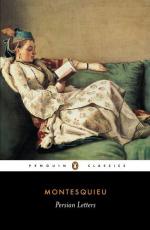|
This section contains 10,473 words (approx. 35 pages at 300 words per page) |

|
SOURCE: Schaub, Diana J. “Montesquieu's Untraditional Despotism.” In Erotic Liberalism: Women and Revolution in Montesquieu's Persian Letters, pp. 19-39. Lanham, Md.: Rowman and Littlefield, 1995.
In this excerpt from her study of Montesquieu's Persian Letters, Schaub discusses Montesquieu's concept of despotism, comparing it to the political philosophy of Tocqueville, Machiavelli, Hobbes, and Locke. Schaub links Montesquieu's own philosophy to his positive view of pleasure and sexuality, embodied in the Persian Letters in his treatment of the women of the seraglio.
Because the Persian Letters is concerned with the articulation of despotic government (and the interrelationship between domestic, religious, and political despotism) more than with its positive alternative, moderate government, it might be described as having a largely “negative” character.1 However, it is not negative in the sense of being a separate and merely preliminary undertaking; rather the Persian Letters is like the film negative from which Montesquieu's masterpiece, The...
|
This section contains 10,473 words (approx. 35 pages at 300 words per page) |

|


